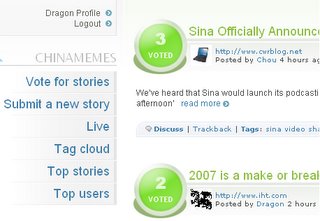China Tech Roundup
China Internet and Technology Roundup provided by Chinamemes.com:
Xunlei Network Technology Confirms Google Investment
Shenzhen Xunlei Network Technology, the Chinese P2P video software company has confirmed that Google will become an investor in the company, according to a Bloomberg news report.
Haier to Acquire Founder as China`s Second Largest PC Maker
The Haier Group, mainland China`s largest home appliance manufacturer, has confirmed its acquisition of the Founder Group, China`s second largest maker of personal computers.
The Chinese Discover Central Europe
In a strange paradox of globalization, mainland manufacturers are spending millions to establish factories in EU member countries.
Sohu Loses Illegal Movie Download Suit
A local Chinese judge has sentenced web portal Sohu.com (SOHU) to pay over RMB1.08 million (about $ 140.000) as compensation to five international entertainment companies because the portal provided illegal downloading of the companies' films to Internet users.
China has 830 million phone users, 132 million online
The number of Chinese fixed and mobile telephone subscribers has hit 830 million, while 132 million use the Internet, the state-run Xinhua news agency has reported, citing government statistics.
Earthquake disrupts Internet access in Asia
In what local analysts are blaming on the 6.7 earthquake off the coast of Taiwan yesterday, communications and Internet access throughout Asia have been disrupted.
Google, China Mobile to launch mobile search service
Google Inc and China Mobile will launch a mobile search service in 2007.
Chinamemes.com - Oberserving China's Digital Revolution



















